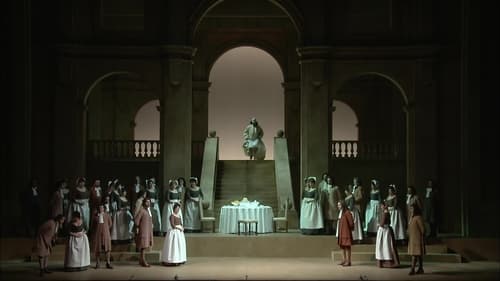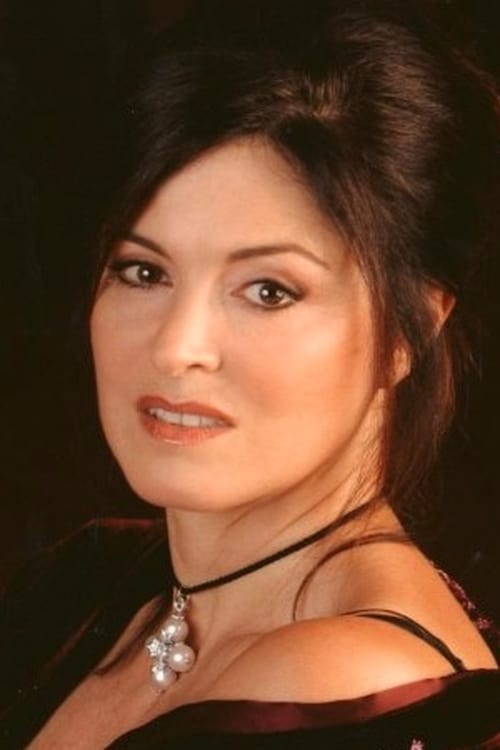
Anna Caterina Antonacci
出生 : 1961-04-05, Ferrara, Italy
略歴
Anna Caterina Antonacci is widely acknowledged as a major artist, and her extraordinary vocal timbre and great acting skills have enabled her to perform a vast and varied repertoire in the world's most important theatres. She has scored notable personal success as Cassandre (Les Troyens) with Sir John Eliot Gardiner at the Théâtre du Châtelet Paris, Incoronazione di Poppea at the Théâtre des Champs Elysées, as well as the title role in Medea in Toulouse, at the Teatro Regio Turin and the Châtelet, Paris.
Her debut in a new production of Carmen at the Royal Opera House in Covent Garden conducted by Antonio Pappano was a huge triumph, performed also at the Opera Comique conducted by John Eliot Gardiner, and was a precursor to her return to London as Cassandre (Les Troyens) at Covent Garden and the BBC Proms. Also revered for her interpretations of Berlioz' vocal works, performances have included La Mort de Cléopâtre with the Rotterdam Philharmonic conducted by Yannick Nézét-Seguin, with the Hong Kong Philharmonic conducted by John Nelson and with the LPO again with Nézét-Seguin.
Anna Caterina has been honoured with the 'Chevalier de l'Ordre National de la Légion d'honneur' by the French Republic, which is the highest national distinction one can receive. Her first recording, Era la Notte for the Naive label received great acclaim. She has also recorded L'Alba separa dalla luce l'ombra for Wigmore Live, with her pianist Donald Sulzen, featuring songs by Tosti, Cilea, and Hahn.

Maddalena Tagliaferri
Based on true events of the late 60s in Italy, poet, playwright and myrmecologist Aldo Braibanti is prosecuted and sentenced to prison for the love he shares with his barely-of-age pupil and friend, Ettore. Amidst a chorus of voices of accusers, supporters and a largely hypocritical public, a single committed journalist takes on the task of piecing together the truth, between secrecy and desire, facing suspicion and censorship in the process.

Queen Elizabeth I
Performed at Madrid's historic Teatro Real in 2018, Ivor Bolton conducts Benjamin Britten's opera based on Lytton Strachey's 1928 Elizabeth and Essex: A Tragic History. In her repeated clashes with the Earl of Essex-a longtime favorite of the queen who was ultimately put to death for treason-Elizabeth I is depicted as flawed and vain, human and sympathetic.

Susanna
Klementia, who has been a nun for several years, is troubled by an apparition of Saint Susanna. The latter, performed by Anna Caterina Antonacci, lifts the veil on a carnal world she finds disturbing. Encouraged to confide by this awakening, Klementia recounts the passion of a young girl in the convent who many years before had stripped naked and embraced the body of Christ on the Cross. Darkness and light, life and death, body and soul all struggle and dialogue in this short, smouldering work in which the biblical figure of Susanna takes on an unparalleled psychological dimension.

Cassandre
Witness the fall of Troy and the rise of an even greater nation in Hector Berlioz’s monumental five-part epic The Trojans. Opera legend Susan Graham, a master of the French opera repertoire, leads the cast as the lovesick queen Dido, who welcomes the Trojan refugees to her shores—only to have her heart broken by one of their heroes.

Cassandra
After the destruction of Troy, the Trojan warrior Énée sets out on a journey to found a new dynasty. He meets Didon, Queen of Carthage, and falls in love. But will Énée's love for Didon prove stronger than his sense of duty? LES TROYENS ('The Trojans') is a tour de force of music that ranges from fiery military marches to intense choruses, passionate soliloquies – such as those of the prophetess Cassandre – and the lyrical love duets of Didon and Énée. It is Hector Berlioz's largest work and he wrote the libretto himself, drawing upon his intimate knowledge of Virgil's Aeneid. To the composer's disappointment, LES TROYENS was only performed once in full during his lifetime and was often presented in shortened form during the 20th century. The Royal Opera's production provides a rare chance to see this epic work in its entirety. David McVicar's staging is on an enormous scale, assembling one of the largest casts ever seen at Covent Garden.

La Marchesa del Poggio
Part of Tutto Verdi series - Un giorno di regno (2010) Parma. 'Un giorno di regno, ossia il finto Stanislao' ('A One-Day Reign, or The Pretend Stanislaus', but often translated into English as 'King for a Day') is an operatic melodramma giocoso in two acts by Giuseppe Verdi to an Italian libretto written in 1818 by Felice Romani. Originally written for the Bohemian composer Adalbert Gyrowetz, the libretto was based on the play 'Le faux Stanislas' written by the Frenchman Alexandre Vincent Pineu-Duval in 1808.

Carmen
About the Director: John Eliot Gardiner is one of the most versatile conductors of our time. Acknowledged as a key figure in the early music revival, he is the founder and artistic director of the Monteverdi Choir, the English Baroque Soloists and the Orchestre Révolutionnaire et Romantique. The extent of his repertoire is illustrated in over 250 recordings which have received numerous international awards. Over the years Gardiner has won more Gramophone awards than any other artist. Probably the most francophile of English conductors, John Eliot Gardiner returned to the Opéra Comique, Paris for a much aclaimed production of Carmen last year. On June 25th it was broadcast live to 50 theatres in France and Switzerland and also recorded for TV. This followed an exciting collaboration that began in December 2007 with Chabrier s Opera bouffe L'Etoile, which had opened the new theatre at Opera Comique in December 2007.

Donna Elvira
Wolfgang Amadeus Mozart's Don Giovanni is performed live at the Theater an der Wien in this 1999 production starring Carlos Alvarez in the title role and featuring the music of the Choir and Orchester der Weiner Staatsoper performing under the guiding wand of conductor Riccardo Muti.

The story takes place in Corinth, in Creon's palace. Glauce (the king's daughter) is making preparations for her wedding with Jason; the hero has repudiated Medea, his wife - with whom he had two children - who once helped him to recover the Golden Fleece. The Argonauts arrive to pay homage to the bride, who cannot hide her fear of Medea. Medea manages to enter the king's palace and begs for Jason's return; when he refuses, the sorceress curses him and swears vengeance; then, alone with him, she recalls the happy moments of their love. Creon orders Medea to leave Corinth and she pretends to agree, obtaining permission to spend one more day with her children; meanwhile, she orders Neris, her maidservant, to take to Glauce her wedding present: the diadem and mantle given to her by Apollo.

Two queens on one island. A recipe for disaster. Especially as both have a legitimate claim to the other's throne. They are, after all, related... So the power politics are the name of the game. And, for reasons of state, one of the heads that wears a crown has to roll. Maria Stuarda was laid to rest for more than a hundred years, finally being revived in 1958 in Bergamo under conductor Oliviero de Fabritiis. However the real breakthrough for the opera finally came with Giorgio de Lullo's Florentine production for the Maggio Musicale in 1967 (with set design and costumes by Pier Luigi Pizzi, director, set designer and costume designer at La Scala in 2008). As the two queens, Leyla Gencer and Shirley Verrett, set the vocal standards. Since then, the triumph of Maria Stuarda has been unstoppable.

Carmen
Jonas Kaufmann and Anna Caterina Antonacci bring rare erotic intensity to the drama of Don José and Carmen in this darkly passionate reading of one of the most popular operas. Kaufmann uses his burnished tenor and smouldering good looks to portray the man undone by Carmen's love. As the object of his desire, Antonacci gives a physical and compelling performance.

Cassandra
This epic opera follows Virgil, beginning as the Greeks appear to have ceded the field after ten years of the Trojan War. Cassandra tries to warn of the terrible fate to come, but fate is set and Troy falls. The first two acts cover this tragic end, then the flight of survivors to Carthage and events at Carthage continue in acts 3 - 5, culminating in the further voyage for Italy and Rome. This is Virgil's classic epic, in operatic form, in about a three and a half hour performance from French Opera.

Rodelinda
Jean-Marie Villegier's modern interpretation of Handel's "Rodelinda" – filmed live at the world-renowned Glyndebourne Opera House in the United Kingdom, sets the timeless tale of jealousy and treachery in the black-and-white world of the silent-movie era. Soprano Anna Caterina Antonacci sings the title role of Rodelinda, with tenor Kurt Streit and bass Umberto Chiummo performing the parts of Grimoaldo and Garibaldo, respectively.

Ermione
Recorded at the Glyndebourne Festival Opera in 1995, this acclaimed presentation of composer Gioachino Rossini's epic opus ERMIONE is based on Jean Racine's play "Andromache." Set in Troy after the city fell to the Greeks, the production recounts the rancorous battle between widow Andromache and Helen of Troy's green-eyed daughter, Ermione for the love of Pyrrhus

Dama de Lady Macbeth
Claude D'Anna's film of Verdi's Macbeth is a gloomy affair, stressing the descent into madness of the principal villains. It's acted by the singers of the Decca recording of the opera (with two substitutions of actors standing in for singers) and the lip-synching is generally unobtrusive. The musical performance is superb, conducted by Riccardo Chailly with admirable fire, and sung by some of the leading lights of the opera stages of the 1980s. Shirley Verrett virtually owned the role of Lady Macbeth at the time, and she delivers a terrific performance, the voice equal to the role's wide register leaps and it's suffused with emotion, whether urging her husband on to murder or maddened by guilt in the Sleepwalking Scene. Leo Nucci's resonant Macbeth may lack the ultimate in vocal color and steadiness (his last notes of the great aria Pietà, rispetto, amore are wobbly) but he compensates with intensity in both singing and acting.

Ninetta
I Vespri Siciliani must me Verdi's most underrated masterpiece. Most people are put off by the fact that it has 5 acts, therefore they conclude that it must be incredibly long. It is long but not as long as some people may fear as most of the acts are under half an hour each. The total length of the DVD in question is 171 minutes, just under 3 hours, including titles at the beginning, applauses and curtain calls between the acts and at the end. The opera contains Verdi's most powerful overture and a number of very elegant arias, duets and ensembles for the principals.

Kate Pinkerton
Opera at La Scala Milan







